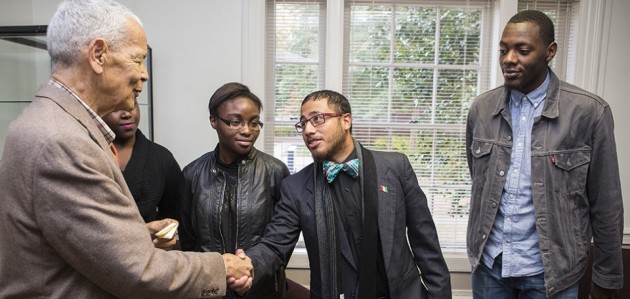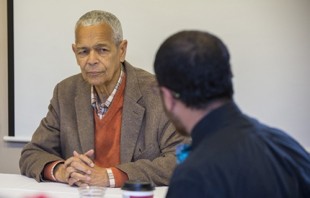Publisher's note: The author of this post, Spaine Stephens, is a contributor to ECU News Services.
Civil Rights activist shares insight on power of music
Swaying to the sounds of some of the most iconic songs in American history, Julian Bond drove home a message: when it came to race relations during some of the last century's most tumultuous years, music defied bounds.
Bond delivered "Crossing the Color Line: From Rhythm 'n Blues to Rock 'n Roll" Nov. 18 in a packed Wright Auditorium. The presentation was this year's Lawrence F. Brewster Lecture in History, part of the Thomas Harriot College of Arts and Sciences' Voyages of Discovery Lecture Series.
"Rock 'n roll history is American history," Bond said. Like the country itself, the music over the years experienced its own tragedies and triumphs and boasted its share of heroes and villains, he added.
Melissa Haithcox-Dennis, director of ECU's Ledonia Wright Cultural Center, enjoys a moment with Julian Bond.
A well-known activist in the civil rights and peace movements, Bond is distinguished professor in residence in the Department of Government at American University and professor emeritus at the University of Virginia.
Once a student of Dr. Martin Luther King, Jr., Bond staged peaceful sit-ins during civil rights protests, and in 1960 helped found the Student Non-Violent Coordinating Committee. He later served as president of the Atlanta branch of the NAACP, and in 1968 became the first African American to be nominated for the vice presidency of the United States.
Bond's visit to ECU was
"a homecoming of a different sort," Harriot College Dean Dr. William Downs told the crowd in his introduction. The event commemorated Bond's 1970 visit to campus, when he was a 30-year-old Georgia state legislator. During that speech, he addressed the Civil Rights Movement.
Before Bond took the stage this year, ECU honored area physicians—including Drs. Andrew Best, Malene Irons, Fred Irons, Ray Minges, Earl Trevathan and Sydney Barnwell—for leading the community and the region toward improvements in social health.
Bond said music helped blur the lines that were hard set between races and classes in America. As it evolved and the technology and media through which it was distributed became more modern, rhythm 'n blues and other genres
"introduced white young people to black America," he said.
Bond illustrated his lecture with slides and music clips to show how races and cultures intertwined based on the evolution of sound and style; Johnnie Ray was in the '50s the only white act in a Detroit club, and Ray Charles found inspiration in the Grand Ole Opry.
Bond capped his presentation by cueing the first strains of
"Lift Every Voice and Sing," bringing the audience—made up of elementary school students, ECU students, administrators and community members—to their feet.
"Julian Bond's most important message is that music has the power to bring people together in ways they might never have thought possible," said John Tucker, professor of history, university historian and director of the lecture series.
"Most fundamentally, the power of music issues from the soul of humanity, and through it, we are reminded of our essential unity and common bond as human beings."
Earlier in the day, Bond visited the Ledonia Wright Cultural Center, where he hosted students and faculty in two question-and-answer sessions. The group of approximately 15 students seemed awed by Bond at first, but his sense of humor and willingness to pose for "selfie" photos with them encouraged them to delve into serious social topics.
Bond presented a question-and-answer session with a small group at the Ledonia Wright Cultural Center before the lecture Tuesday evening.
Several students implored Bond to tell them what they could do to help get other students and young people motivated to protest or support some of the most important issues facing America, from race relations to economic justice to politics and new voting laws.
"There are a lot of things you should be doing," Bond said, leaning forward and fixing his gaze on one student.
"You're young; you can do a lot. You know you can do a lot."
He encouraged the students to not only talk about social change for the better, but also to act on it every day and make it a natural part of life. He shared one student's frustration that her generation appears to be less active in many critical aspects of society, and agreed that race relations are
"not as good as they ought to be," he said.
He urged students to concentrate on learning and growing personally and academically, but to make sure their focus is on becoming their true selves who make a difference to those around them.
"Study long, but don't study wrong," he said.
His visit with the students also had light-hearted moments brought on by Bond's sense of humor. He reminisced about his host appearance on "Saturday Night Live" and recalled acting with Richard Pryor in the 1977 movie "Greased Lightning." He also plugged his upcoming appearance in the movie "5 to 7," starring Glenn Close. Chris Battle, a senior in rehabilitation services, was selected to attend the student session with Bond because of his leadership through the National Panhellenic Council. He was enthusiastic about the chance to interact with Bond on such a personal level.
"It's kind of unbelievable," he said,
"being that he's done so much for men like me. He's so real and easy to be around. I'm really grateful to have this experience."
As dean of Harriot College, Downs attended the student and faculty sessions as well. He said the series allows students to have unique experiences with people they might not otherwise encounter.
"This is a public university at its best," Downs said.
"There's no other time when students get to rub elbows and take selfies with someone who helped changed this country. It makes it all worthwhile."
The Voyages of Discovery Lecture Series is cosponsored by the Office of the Chancellor, Office of the Provost, Division of Health Sciences, Division of Student Affairs and the Department of History.
"The lecture series brings people together in provocative encounters featuring leaders of renown from many backgrounds and perspectives," Tucker said.
"Jane Goodall, Jean-Michel Cousteau, Julian Bond and other outstanding leaders have given audiences unique experiences that are not only memorable, but hopefully inspire them to more meaningful engagement with the problems that challenge us all."

Selected ECU students including Joseph Garcia, shaking hands with Bond in the photograph above, enjoyed the opportunity to interact with visiting activist Julian Bond at ECU's Ledonia Wright Cultural Center Nov. 18. Bond urged the students to get involved in social issues to change the world for the better. (Photos by Cliff Hollis)

























